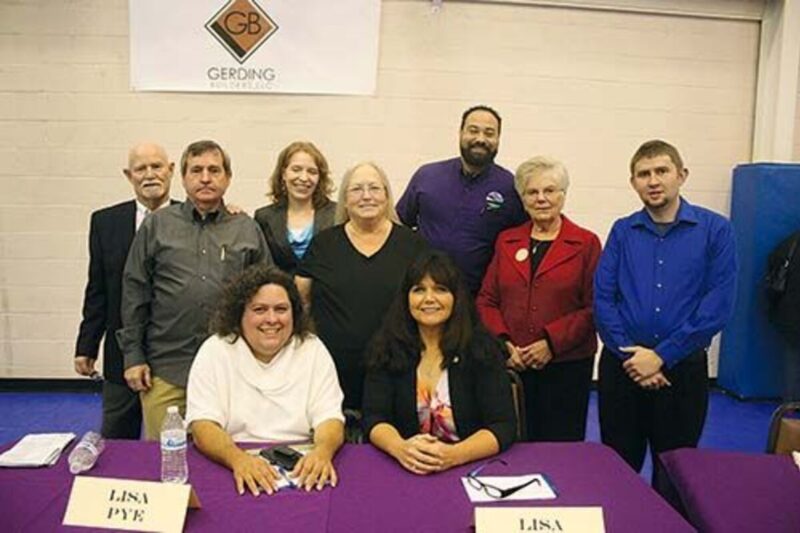Sean C. Morgan
Eight City Council candidates tackled a variety of topics, including some significant time discussing economic development, during a forum held Thursday at the Jim Riggs Community Center.
The candidates included incumbent James Goble, Susan Coleman, Andrew Allen, Theresa Howard, Lisa Pye, Lisa Gourley, incumbent Diane Gerson and incumbent Dave Trask.
The event was organized by the Sweet Home Chamber of Commerce and The New Era. It was moderated by chamber Board Member Bill Matthews. An audience of 35 was present to listen and ask questions.
The candidates discussed the new City Hall, water rates, marijuana, leadership and management as well.
Goble said councilors need to focus on Sweet Home’s downtown core.
“There’s a lot of things we need to do, like building improvement (and filling empty buildings). How do we help the community do that?
“We’re at an economic standstill except for a small portion. We have groups that are working toward that, but until we find a city manager that’s going to help us move forward, we’ll be at a standstill for a little while.”
Coleman said councilors should determine what the business owners’ needs are in the community. “Especially, how can we help them succeed? Which kind of business can we draw into Sweet Home to build up the assets we already have? Providing more opportunity for employment would be the biggest benefit of both of those options.”
Sweet Home needs to fill the empty buildings, she said, and build on what’s already there.
On economic development, Allen said the city needs to develop a partnership again to provide an economic development director and to “focus on where our potential is.”
Obviously, Sweet Home is a bedroom community, and that changes a lot of things because Sweet Home is distant from the main thoroughfare, Interstate Five, and rail lines, he said. Sweet Home has a strong potential as a recreation hub.
Referencing his recent decision to close his brick-and-mortar storefront Two Dam Bagel and Bread Co. to focus on delivery and wholesale production, he suggested that Internet-based businesses may be more viable as brick-and-mortar businesses become less necessary.
Howard described the city’s economic situation as “stagnant,” calling it “sad.”
“We really need some business in this town,” she said. It’s hard to find to a job.
“We have so much natural beauty here for tourism, more tourism than we have now,” Howard said. “We need to promote it a lot more than we do. We really need to think about doing something about it.”
Pye agreed that Sweet Home needs to bring in new businesses.
“If we’re going to bring in new business, we have to do things to attract new businesses to our community,” she said.
Businesses with 500 to 1,000 people aren’t knocking on Sweet Home’s door, Gourley said, but Sweet Home has assets, including ample water, space for growth and a work force.
“We just need to keep developing ourselves and keep our eye on the ball so that those business will take us seriously and look and want to be here,” she said. Look at the development in Lebanon and communities around Sweet Home.
Sweet Home has the most to offer, with the lakes, rivers and mountains, as well as “phenomenal diversity” in recreation – reasons people would want to live here, she said. While businesses locate in Lebanon, Sweet Home can attract secondary businesses here where people will use Sweet Home’s rivers and lakes then go home or decide to come here and develop their small businesses, which can create a stable economy.
Sweet Home needs to stay focused on the goals in its economic development plans, she said.
Gerson said Sweet Home needs an economic development plan and director.
Economic development isn’t something the City Council can do on its own, she said. It needs help, and it’s doing that by working on that with a group of people who have trained with the Ford Family Foundation.
Different organizations, including the city, Chamber of Commerce and Sweet Home Economic Development Group, need to collaborate more on ideas instead of everybody going in different directions, she said.
Trask made it clear that he is focused on economic development.
“We have been sold a bill of goods that we can’t attract business to this community,” he said. “That’s a crock. We have failed miserably. I think we’re working toward getting back to that. We’re not dying, but we can’t depend on recreation alone. That’s a big part of our city. We know that.
“To be told that we can’t get someone to come here because we’re too far from I-5, that’s boloney. We haven’t given anyone a reason to come here. I think the council and the city can do something to make that happen, whether that’s giving some sort of break on our water. I don’t know what the answer to that is necessarily, but Lebanon’s booming. Everywhere you go across the state, things are being built all over. We can do this. We just have to work harder at it.”





